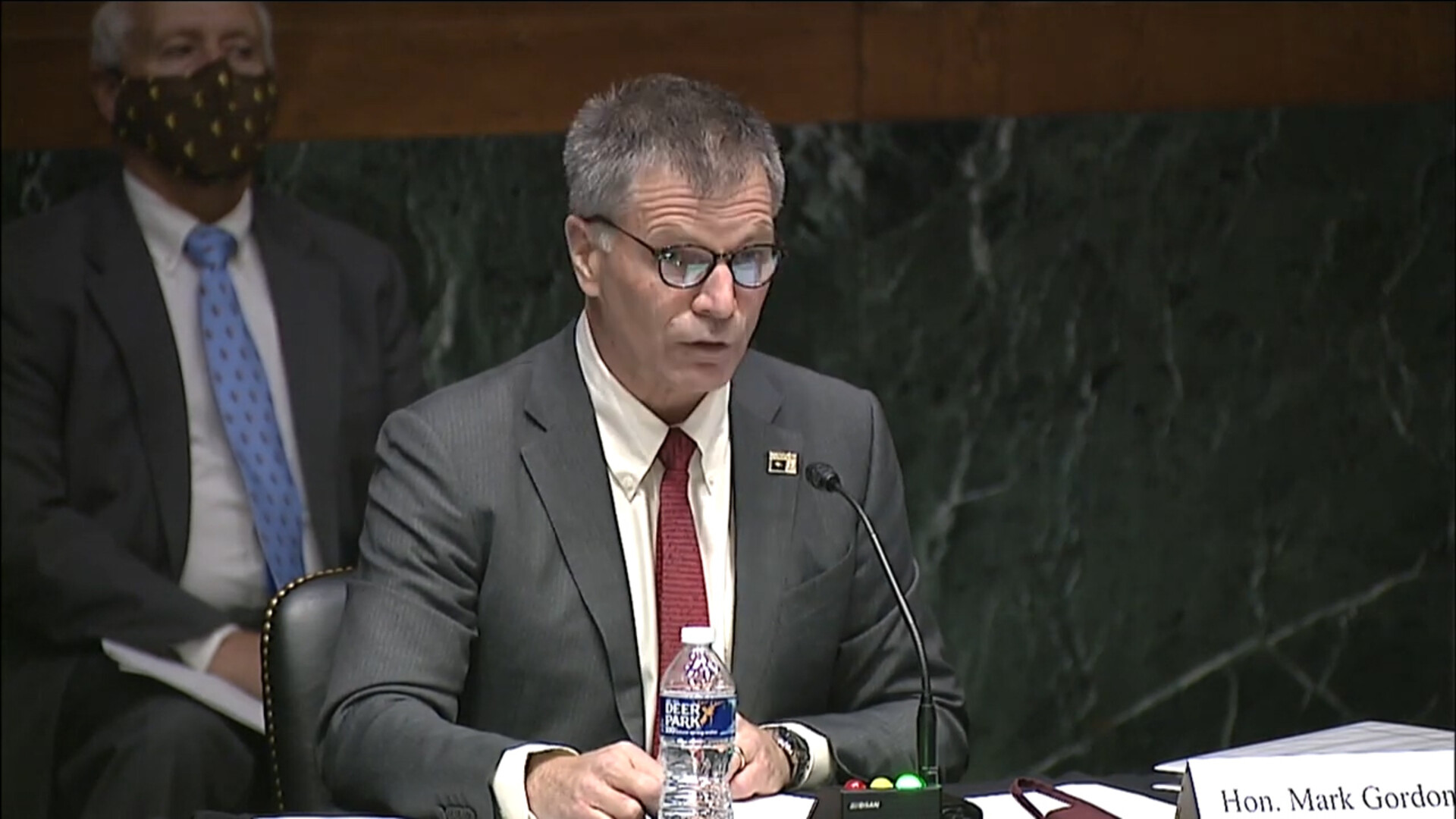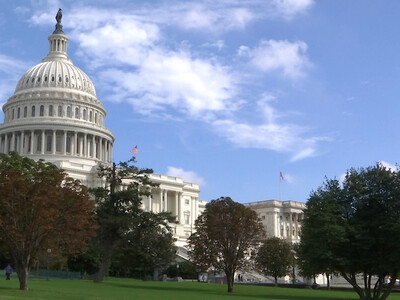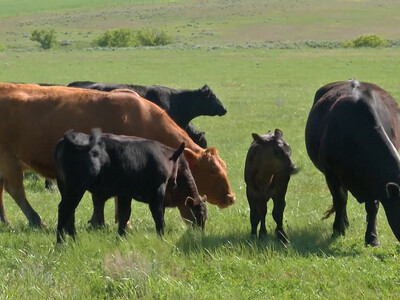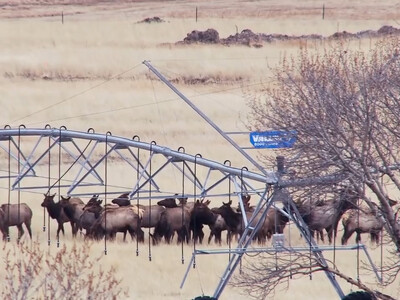Wyoming Governor Mark Gordon Testifies Before the Senate on Endangered Species Act
This week U.S. Senator John Barrasso (R-WY), chairman of the Senate Committee on Environment and Public Works (EPW), welcomed the Honorable Mark Gordon, governor of Wyoming, to the committee. Gordon was testifying before the committee at a legislative hearing on S. 4589, the Endangered Species Act Amendments Act of 2020.The legislative hearing focused on legislation introduced by Barrasso to reauthorize the Endangered Species Act (ESA) for the first time since 1992, elevate the role of states and increase transparency in the implementation of the ESA. It also prioritizes resources to help meet conservation goals, while providing regulatory certainty to promote recovery activities.
Barrasso’s legislation was inspired by the bipartisan Western Governors’ Association’s (WGA) Species Conservation and Endangered Species Act Initiative in drafting the legislation.
Click here to watch Governor Gordon’s testimony.
Barrasso introduced Gordon to the committee prior to his testimony. “First, I would like to introduce Wyoming Governor Mark Gordon, who has been serving as Governor since January 2019. Governor Gordon grew up on a ranch outside of Kaycee, Wyoming. He worked there after graduating from college. He then started his own ranch, as well as several successful outdoor recreation and tourism businesses in both Buffalo and Sheridan, Wyoming.
“Today, Governor Gordon and his wife, Jennie, own and operate the Merlin Ranch east of Buffalo, which has been recognized by the Society for Range Management with the Excellence in Range Stewardship Award. Prior to his election as governor, he served as Wyoming state treasurer from 2012 to 2019. Governor Gordon’s efforts to improve the state’s financial portfolio resulted in Wyoming being ranked number one in the country for transparency.
“Governor Gordon’s service to Wyoming does not stop there. He has served in a variety of other positions, including as a member of the boards of – the Wyoming Wildlife and Natural Resource Trust; the Nature Conservancy in Wyoming; the Wyoming Environmental Quality Council; and the Powder River Conservation District in Johnson County, Wyoming. I hope Governor Gordon will tell us about some of his experiences in Wyoming balancing the interests of citizens, while effectively conserving and recovering wildlife.
“Governor Gordon, it is a great honor to welcome you again as a witness before the Environment and Public Works Committee. Thank you for traveling from Wyoming to Washington today to be part of this hearing,” said Barrasso.
In his written testimony, Gordon explained the need to update the Endangered Species Act. “While the Act has been effective in protecting and recovering many species of wildlife, improvements are needed to better align the Act with its original intent—to protect imperiled species, recover them in accordance with scientific recovery objectives and to delist or remove species from the threatened or endangered species list. The Act hasn’t been updated since 1988 and the bill your committee is considering today includes many amendments that, if passed, would serve to make the Act more effective,” wrote Gordon.
Gordon detailed the importance of allowing states and tribes to play a large role in wildlife management. “The work states and tribes carry out every day across our country for imperiled species conservation is a vital component to the discussion of recovery efforts. Despite the fact that little to no federal funding exists to support state’s efforts nor that no specific mandates require states to take certain actions in the ESA, they do it anyway. Critics of amending the Act seem to insinuate that states do not want to conserve at risk species or that states lack the capacity and expertise. Nothing could be further from the truth. The public trust doctrine outlined in the North American Model of Wildlife Conservation is the bedrock for wildlife conservation in our country. Most wildlife in our country are managed, and managed quite well, by state and tribal governments in trust for their citizens. I am proud of the significant achievements state wildlife managers in my state and others across the nation have accomplished. Wildlife continues to be abundant and diverse and this is due in large part to the efforts of states and tribes,” stated Gordon.
Gordon also discussed the wildlife management and species conservation specifically in Wyoming. He used examples of the grizzly bear, the gray wolves, the black-footed ferret, the greater sage-grouse, the Wyoming toad, and the Canada lynx. “Wyoming is proud to be a leader in managing at-risk species and recovering those species listed under the Act. We have also taken a proactive role to address challenges before a need arises to list species under the Act. Wyoming has many notable examples of contributions. Some demonstrate ESA successes and some demonstrate areas where ESA improvement is warranted,” said Gordon.
Wyoming’s governor lauded the bill for the necessary changes it would make to the Endangered Species Act. “This bill’s prohibition of judicial review during post-delisting monitoring is necessary and will not be harmful to species conservation. Giving states and tribes a period of time as defined by the post-delisting monitoring period to implement their state and tribal management plans makes good sense and is protected by stop-gaps in the existing ESA. Prohibiting judicial review during post-delisting monitoring is harmless due in large part to the fact that during this period, the USFWS could immediately re-list the species if it were to decline or fall below recovery objectives and other parameters of the recovery plan. The states have proven time and time again they are committed to and capable of managing wildlife within their borders. They should be given the chance to do so for delisted species without the threat of endless and costly lawsuits that in the end do not benefit the species in question,” stated Gordon.
Gordon concluded by stating, “Congress showed great vision and wisdom when they enacted the Endangered Species Act. However, implementation of the Act clearly shows that many of their original intentions are not being met. Less than 3 percent of those species listed have been delisted. The ESA is no longer working effectively and is in desperate need of revision. I hope you are able to work cooperatively with all of your colleagues to find a path forward to enhance the Act to a level where it revitalizes conservation for decades to come. Protecting and conserving America’s wildlife is a noble cause supported by nearly all of our citizens. It reflects American values and puts us in a leadership role globally on the importance of wildlife and habitat conservation.”
For more information on Gordon’s testimony and the hearing, click here.
Source: U.S. Senate Committee on Environment and Public Works


















